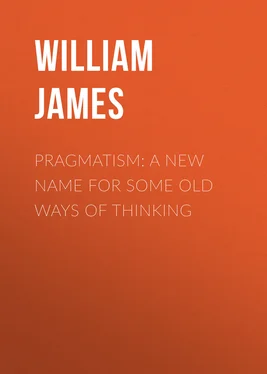William James - Pragmatism - A New Name for Some Old Ways of Thinking
Здесь есть возможность читать онлайн «William James - Pragmatism - A New Name for Some Old Ways of Thinking» — ознакомительный отрывок электронной книги совершенно бесплатно, а после прочтения отрывка купить полную версию. В некоторых случаях можно слушать аудио, скачать через торрент в формате fb2 и присутствует краткое содержание. Жанр: foreign_antique, Философия, foreign_edu, на английском языке. Описание произведения, (предисловие) а так же отзывы посетителей доступны на портале библиотеки ЛибКат.
- Название:Pragmatism: A New Name for Some Old Ways of Thinking
- Автор:
- Жанр:
- Год:неизвестен
- ISBN:нет данных
- Рейтинг книги:5 / 5. Голосов: 1
-
Избранное:Добавить в избранное
- Отзывы:
-
Ваша оценка:
- 100
- 1
- 2
- 3
- 4
- 5
Pragmatism: A New Name for Some Old Ways of Thinking: краткое содержание, описание и аннотация
Предлагаем к чтению аннотацию, описание, краткое содержание или предисловие (зависит от того, что написал сам автор книги «Pragmatism: A New Name for Some Old Ways of Thinking»). Если вы не нашли необходимую информацию о книге — напишите в комментариях, мы постараемся отыскать её.
Pragmatism: A New Name for Some Old Ways of Thinking — читать онлайн ознакомительный отрывок
Ниже представлен текст книги, разбитый по страницам. Система сохранения места последней прочитанной страницы, позволяет с удобством читать онлайн бесплатно книгу «Pragmatism: A New Name for Some Old Ways of Thinking», без необходимости каждый раз заново искать на чём Вы остановились. Поставьте закладку, и сможете в любой момент перейти на страницу, на которой закончили чтение.
Интервал:
Закладка:
Metaphysics has usually followed a very primitive kind of quest. You know how men have always hankered after unlawful magic, and you know what a great part, in magic, WORDS have always played. If you have his name, or the formula of incantation that binds him, you can control the spirit, genie, afrite, or whatever the power may be. Solomon knew the names of all the spirits, and having their names, he held them subject to his will. So the universe has always appeared to the natural mind as a kind of enigma, of which the key must be sought in the shape of some illuminating or power-bringing word or name. That word names the universe's PRINCIPLE, and to possess it is, after a fashion, to possess the universe itself. 'God,' 'Matter,' 'Reason,' 'the Absolute,' 'Energy,' are so many solving names. You can rest when you have them. You are at the end of your metaphysical quest.
But if you follow the pragmatic method, you cannot look on any such word as closing your quest. You must bring out of each word its practical cash-value, set it at work within the stream of your experience. It appears less as a solution, then, than as a program for more work, and more particularly as an indication of the ways in which existing realities may be CHANGED.
THEORIES THUS BECOME INSTRUMENTS, NOT ANSWERS TO ENIGMAS, IN WHICH WE CAN REST. We don't lie back upon them, we move forward, and, on occasion, make nature over again by their aid. Pragmatism unstiffens all our theories, limbers them up and sets each one at work. Being nothing essentially new, it harmonizes with many ancient philosophic tendencies. It agrees with nominalism for instance, in always appealing to particulars; with utilitarianism in emphasizing practical aspects; with positivism in its disdain for verbal solutions, useless questions, and metaphysical abstractions.
All these, you see, are ANTI-INTELLECTUALIST tendencies. Against rationalism as a pretension and a method, pragmatism is fully armed and militant. But, at the outset, at least, it stands for no particular results. It has no dogmas, and no doctrines save its method. As the young Italian pragmatist Papini has well said, it lies in the midst of our theories, like a corridor in a hotel. Innumerable chambers open out of it. In one you may find a man writing an atheistic volume; in the next someone on his knees praying for faith and strength; in a third a chemist investigating a body's properties. In a fourth a system of idealistic metaphysics is being excogitated; in a fifth the impossibility of metaphysics is being shown. But they all own the corridor, and all must pass through it if they want a practicable way of getting into or out of their respective rooms.
No particular results then, so far, but only an attitude of orientation, is what the pragmatic method means. THE ATTITUDE OF LOOKING AWAY FROM FIRST THINGS, PRINCIPLES, 'CATEGORIES,' SUPPOSED NECESSITIES; AND OF LOOKING TOWARDS LAST THINGS, FRUITS, CONSEQUENCES, FACTS.
So much for the pragmatic method! You may say that I have been praising it rather than explaining it to you, but I shall presently explain it abundantly enough by showing how it works on some familiar problems. Meanwhile the word pragmatism has come to be used in a still wider sense, as meaning also a certain theory of TRUTH. I mean to give a whole lecture to the statement of that theory, after first paving the way, so I can be very brief now. But brevity is hard to follow, so I ask for your redoubled attention for a quarter of an hour. If much remains obscure, I hope to make it clearer in the later lectures.
One of the most successfully cultivated branches of philosophy in our time is what is called inductive logic, the study of the conditions under which our sciences have evolved. Writers on this subject have begun to show a singular unanimity as to what the laws of nature and elements of fact mean, when formulated by mathematicians, physicists and chemists. When the first mathematical, logical and natural uniformities, the first LAWS, were discovered, men were so carried away by the clearness, beauty and simplification that resulted, that they believed themselves to have deciphered authentically the eternal thoughts of the Almighty. His mind also thundered and reverberated in syllogisms. He also thought in conic sections, squares and roots and ratios, and geometrized like Euclid. He made Kepler's laws for the planets to follow; he made velocity increase proportionally to the time in falling bodies; he made the law of the sines for light to obey when refracted; he established the classes, orders, families and genera of plants and animals, and fixed the distances between them. He thought the archetypes of all things, and devised their variations; and when we rediscover any one of these his wondrous institutions, we seize his mind in its very literal intention.
But as the sciences have developed farther, the notion has gained ground that most, perhaps all, of our laws are only approximations. The laws themselves, moreover, have grown so numerous that there is no counting them; and so many rival formulations are proposed in all the branches of science that investigators have become accustomed to the notion that no theory is absolutely a transcript of reality, but that any one of them may from some point of view be useful. Their great use is to summarize old facts and to lead to new ones. They are only a man-made language, a conceptual shorthand, as someone calls them, in which we write our reports of nature; and languages, as is well known, tolerate much choice of expression and many dialects.
Thus human arbitrariness has driven divine necessity from scientific logic. If I mention the names of Sigwart, Mach, Ostwald, Pearson, Milhaud, Poincare, Duhem, Ruyssen, those of you who are students will easily identify the tendency I speak of, and will think of additional names.
Riding now on the front of this wave of scientific logic Messrs. Schiller and Dewey appear with their pragmatistic account of what truth everywhere signifies. Everywhere, these teachers say, 'truth' in our ideas and beliefs means the same thing that it means in science. It means, they say, nothing but this, THAT IDEAS (WHICH THEMSELVES ARE BUT PARTS OF OUR EXPERIENCE) BECOME TRUE JUST IN SO FAR AS THEY HELP US TO GET INTO SATISFACTORY RELATION WITH OTHER PARTS OF OUR EXPERIENCE, to summarize them and get about among them by conceptual short-cuts instead of following the interminable succession of particular phenomena. Any idea upon which we can ride, so to speak; any idea that will carry us prosperously from any one part of our experience to any other part, linking things satisfactorily, working securely, simplifying, saving labor; is true for just so much, true in so far forth, true INSTRUMENTALLY. This is the 'instrumental' view of truth taught so successfully at Chicago, the view that truth in our ideas means their power to 'work,' promulgated so brilliantly at Oxford.
Messrs. Dewey, Schiller and their allies, in reaching this general conception of all truth, have only followed the example of geologists, biologists and philologists. In the establishment of these other sciences, the successful stroke was always to take some simple process actually observable in operation—as denudation by weather, say, or variation from parental type, or change of dialect by incorporation of new words and pronunciations—and then to generalize it, making it apply to all times, and produce great results by summating its effects through the ages.
The observable process which Schiller and Dewey particularly singled out for generalization is the familiar one by which any individual settles into NEW OPINIONS. The process here is always the same. The individual has a stock of old opinions already, but he meets a new experience that puts them to a strain. Somebody contradicts them; or in a reflective moment he discovers that they contradict each other; or he hears of facts with which they are incompatible; or desires arise in him which they cease to satisfy. The result is an inward trouble to which his mind till then had been a stranger, and from which he seeks to escape by modifying his previous mass of opinions. He saves as much of it as he can, for in this matter of belief we are all extreme conservatives. So he tries to change first this opinion, and then that (for they resist change very variously), until at last some new idea comes up which he can graft upon the ancient stock with a minimum of disturbance of the latter, some idea that mediates between the stock and the new experience and runs them into one another most felicitously and expediently.
Читать дальшеИнтервал:
Закладка:
Похожие книги на «Pragmatism: A New Name for Some Old Ways of Thinking»
Представляем Вашему вниманию похожие книги на «Pragmatism: A New Name for Some Old Ways of Thinking» списком для выбора. Мы отобрали схожую по названию и смыслу литературу в надежде предоставить читателям больше вариантов отыскать новые, интересные, ещё непрочитанные произведения.
Обсуждение, отзывы о книге «Pragmatism: A New Name for Some Old Ways of Thinking» и просто собственные мнения читателей. Оставьте ваши комментарии, напишите, что Вы думаете о произведении, его смысле или главных героях. Укажите что конкретно понравилось, а что нет, и почему Вы так считаете.












